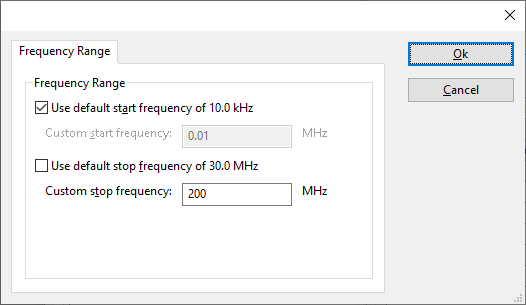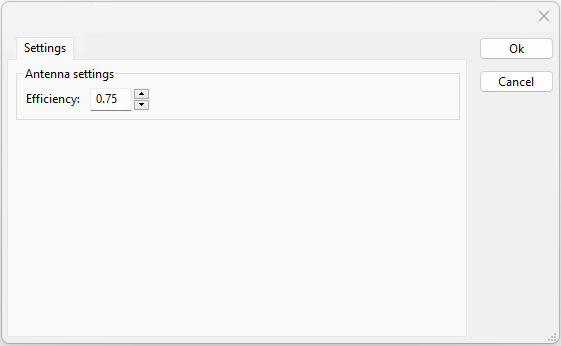Schaffner UPA 6192: Difference between revisions
DevicesBot (talk | contribs) (Updated DeviceDriverInfo template) |
DevicesBot (talk | contribs) (Updated DeviceDriverInfo template) |
||
| Line 2: | Line 2: | ||
|DLLFile=RADANT.DLL | |DLLFile=RADANT.DLL | ||
|DeviceBrand=Schaffner | |DeviceBrand=Schaffner | ||
|DeviceDriverName= | |DeviceDriverName=UPA6192 | ||
|DeviceType=UPA 6192 | |DeviceType=UPA 6192 | ||
|SupportedDeviceTypes=16 | |SupportedDeviceTypes=16 | ||
}} | }} | ||
Revision as of 16:54, 27 February 2020
The Schaffner UPA 6192 device driver is a Antenna which is supported by RadiMation®.
Configuration
The following tabs are available in the advanced configuration of the Schaffner UPA 6192:
The frequency range of the Schaffner UPA 6192 as provided by the manufacturer is shown and selected as default. It is possible to overrule these frequencies and to manual adjust the allowed frequency range of the Schaffner UPA 6192.
| If the checkbox is checked, the default start frequency will be used as the lowest usable frequency in a test for this device. |
| If the Use default start frequency checkbox is unchecked, another start frequency (expressed in MHz) can be specified. The customized start frequency will then be used as the lowest usable frequency in a test for this device. The customized frequency can be a limitation or an extension of the default start frequency. |
| If the checkbox is checked, the default stop frequency will be used as the highest usable frequency in a test for this device. |
| If the Use default stop frequency checkbox is unchecked, another stop frequency (expressed in MHz) can be specified. The customized stop frequency will then be used as the highest usable frequency in a test for this device. The customized frequency can be a limitation or an extension of the default stop frequency. |
Specifying a different frequency range can be useful if for example:
- A device (like a coupler, antenna, injection device, cable, etc...) is still useable (but out of specification) outside the standard suggested frequency range.
- An external mixer is used to measure an extended frequency range.
- An up- or down-convertor is used to shift the frequency range.
- A newer model of a device is present that has an extended frequency range, and still uses the same remote control commands.
Be careful changing these setting as RadiMation® is no longer able to verify if the Schaffner UPA 6192 is used outside frequency range that is specified by the manufacturer. This may result to serious damage of your measurement device.
| Note: | The antenna efficiency factor is only applicable to reverberation chamber testing. |
| The antenna efficiency factor of the antenna. |
The antenna efficiency factor is assumed (if not known) to be 0.75 for a log periodic antenna and 0.9 for a horn antenna. It is a unitless factor with values between 1.00 and 0.00. The antenna efficiency factor is a single fixed value which is used for all the frequencies of the antenna. Values smaller than 0.00 or larger than 1.00 are not allowed and the configuration dialog of the antenna cannot be closed if an invalid value is specified.
An antenna efficiency correction factor can also be selected in the device driver settings dialog in RadiMation®. That correction file contains a value that is a correction that is added on top of the value from the device driver. Negative values down to -1.0 are also allowed as it is a correction on the single fixed value from the antenna driver, and it allows to correct that single fixed value to a lower value. The combination of the single fixed antenna efficiency value from the antenna driver, and the added correction value from the selected correction file, should be between 1.0 and 0.0. If this combined value is invalid for one or more frequencies a specific error is shown during the initialisation of the test.
Related pages
Links
- Google search: Schaffner UPA 6192
- Google image search: Schaffner UPA 6192
| This information about an equipment is automatically generated from the list of supported device drivers from RadiMation. |
| If you need more information you can contact radimation-support@raditeq.com. |

